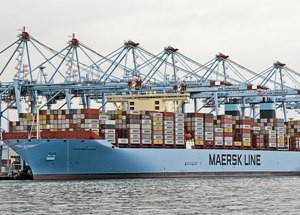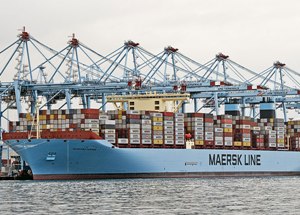 Danish carrier Maersk Line said it intends to place more orders for vessels this year, as it announced a profit of US$2.341 billion in 2014, a 55% improvement from the $1.51 billion income it generated in 2013.
Danish carrier Maersk Line said it intends to place more orders for vessels this year, as it announced a profit of US$2.341 billion in 2014, a 55% improvement from the $1.51 billion income it generated in 2013.
The world’s largest shipping line attributed the growth to lower unit cost and increased volumes that were offset by a rate decrease of 1.6%.
In a written statement, the container shipping unit of A.P. Moller-Maersk said volumes increased by 6.8% to 9.4 million forty-foot equivalent units, while unit cost decreased by 4.3% as a result of efforts to enhance vessel utilization and network efficiency.
“The volume increase is above the 3.6% market growth. However, our market share (capacity) remains at 15% and our long-term strategy is to grow with the market,” it added.
Revenue in 2014 was $27.351 billion.
Soren Skou, CEO of Maersk Line, said, “I am very satisfied with our 2014 result. Our return on invested capital is also very satisfactory and above our medium and long-term targets of 8.5% and 10% respectively. We have achieved this on the backdrop of low market growth and rates under pressure. We have successfully managed our capacity and reduced our costs. I believe 2014 proves that we have the right strategy in place.”
In September, Maersk Line announced investments plan of about $3 billion per annum in 2015-2019. “To ensure that we can continue to grow with the market, we need more vessels and containers by 2017. We expect to start ordering new vessels in the spring of 2015,” said the statement.
This, said Skou, is to remain ahead in a highly competitive industry with over-capacity. “We must remain focused and continue to defend our market position with cost leadership and improved products for our customers,” he said.
For 2015, Maersk Line expects to improve on its 2014 underlying result of $2.2 billion, in part through the implementation of its new East-West network and lower fuel cost, even as it anticipates rates to remain under pressure.
Increasing freight rates will be difficult because supply is expected to grow slightly faster than demand. “We expect the global demand to grow by 3-5% and nominal supply to grow by 5-7%,” it said.
On the low oil price, Maersk Line said it will not directly impact rates. “Rates continue to be determined by the supply and demand balance in each trade, not the fuel price.”
The low oil price will also not entail significant changes to Maersk Line’s network and service speed, as slow-steaming will remain a key element of its operations.
Maersk Line explained that slow-steaming is preferable since time spent in port by its vessels has increased significantly, the new generation of ultra large container ships are designed and built to slow-steam, and changing the speed on its East-West network is costly and complex, involving finding alternatives for freed-up vessels and termination or renegotiation of all charter, vessel-sharing, and terminal agreements.
“The bunker price may rebound, in which case a network designed for higher speed would be very uncompetitive. Moreover, we want to be as energy-efficient as possible, limiting emissions as much as we can. We will continue to slow-steam,” stated Skou.





